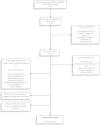The prevalence of anxiety and depression in people with age-related macular degeneration: a systematic review of observational study data
- PMID: 24923726
- PMCID: PMC4094542
- DOI: 10.1186/1471-2415-14-78
The prevalence of anxiety and depression in people with age-related macular degeneration: a systematic review of observational study data
Abstract
Background: Comorbid mental health problems have been shown to have an adverse effect on the quality of life of people with common eye disorders. This study aims to assess whether symptoms of anxiety and/or depression are more prevalent in people with age-related macular degeneration (AMD) than in people without this condition.
Methods: A systematic search of electronic databases (Medline, CINAHL, EMBASE, PsycINFO) from inception to February 2012 was conducted to identify studies of AMD populations which measured symptoms of anxiety and/or depression. Reference checking of relevant articles was also performed. Data on the study setting, prevalence and how anxiety and depression were measured were extracted from the papers. Critical appraisal was performed using the Critical Appraisal Skills Programme (CASP) tools.
Results: A total of 16 papers were included in the review, from an original search result of 597. The prevalence estimates, taken from nine cross-sectional and cohort studies, ranged from 15.7%-44% for depressive symptoms and 9.6%-30.1% for anxiety symptoms in people with AMD. The seven case-control studies found that people with AMD were more likely to experience symptoms of depression compared with those without AMD, but not more likely to experience symptoms of anxiety.
Conclusions: Overall, the evidence suggests that symptoms of depression are more prevalent amongst AMD populations than anxiety symptoms. The heterogeneity of the studies included in this review means that it is difficult to draw strong conclusions as to the true estimates of depression and anxiety symptoms in AMD populations and prevented formal meta-analysis. Further research which specifies clinical anxiety and gives clear definitions as to the type of AMD being investigated is required.
Figures
References
-
- Colquitt J. Pegaptanib and Ranibizumab: Final Protocol. 2006. [Accessed 01.02.2009]. [ http://www.nice.org.uk/nicemedia/pdf/Final_protocol_age_mac_degen.pdf]
-
- Cruess A, Zlateva G, Xu X, Rochon S. Burden of illness of neovascular age-related macular degeneration in Canada. Can J Ophthalmol. 2007;42(6):836–843. - PubMed
-
- Keller BK, Morton JL, Thomas VS, Potter JF. The effect of visual and hearing impairments on functional status. J Am Geriatr Soc. 1999;47:1319–1325. - PubMed
-
- Rovner BW, Zisselman P, Schmuely Y. Depression and disability in elderly persons with impaired vision: a follow up study. J Am Geriat Soc. 1996;44:181–184. - PubMed
Publication types
MeSH terms
Grants and funding
LinkOut - more resources
Full Text Sources
Other Literature Sources
Medical


